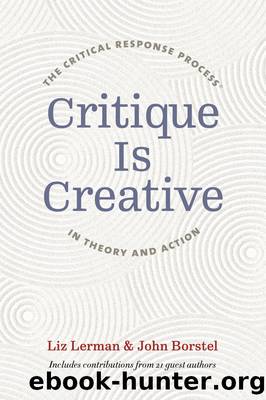Critique Is Creative by Liz Lerman

Author:Liz Lerman
Language: eng
Format: epub
Publisher: Wesleyan University Press
Published: 2022-02-03T00:00:00+00:00
an adaptation of crp for peer review in small seminar courses in stem
Lekelia D. Jenkins
As a young scientist, I prided myself on giving strong, insightful critiques that did not point out petty flaws, but instead revealed methodological weaknesses, over-generalizations, and unsubstantiated conclusions. Following forms of scientific peer review learned in academia, I discovered that such observations did not transfer well to other sectors. On one occasion, as a new government employee, I attended a scientific talk on aquaculture (fish farming) and offered feedback following my typical laser-precise technique. This time, instead of the nods of accord I was used to receiving, the audience stiffened and quieted. My office colleagues studiously avoided eye contact and barely spoke to me for the rest of the afternoon. Then, to my surprise, one of them said, âSo I guess you really donât like aquaculture.â My sharp critique, intended to improve future research, instead led my colleague to think that I despised the whole area of study. It dawned on me that no matter how objective and dispassionate, my critiques sliced deep and exposed the presenter in ways that could be uncomfortable, even painful.
When I became a professor, I wanted my students to learn a better way. Having encountered the Critical Response Process though dance studies at the American Dance Festival, I decided to adapt it for use in two interdisciplinary courses I teach: Case Study Research: Design and Methods, and Project Design for Conservation and Community Development. My students, often from STEM (science, technology, engineering, mathematics) fields, are required to do a final presentation or paper as the basis of a summative assessment for the course as a whole. In preparation for this, the students give a presentation on the work in progress and receive feedback from the other students and me on both the content and the presentation style.
Limited time (fifteen minutes at most for student presentations and feedback) meant we needed to condense CRP for this formative assessment; the different natures of science and art influenced some shifts in sequence and emphasis. The meaning and purpose of scientific presentations are often more explicitly prescribed than in art, making step one of CRP less expansive when applied to science. In science, the meanings of âworksâ (presentations, papers, posters) are often explicitly stated with objectives and conclusions. It is the researchersâ responsibility to make appropriate generalizations about their research and identify limitations, affording less opportunity for the audience to ascribe meaning. Given these challenges, I shortened the Process to reduce the required time and removed step one as an explicit step about meaning. This adapted use of CRP as a formative assessment generally takes the following form:
1.Review of rubric.
Together, presenting and responding students review a comprehensive grading rubric that I provide for the final summative assignment. This identifies aspects of the presentation that are most important and places boundaries on what should and should not be considered, preventing responders from creating new criteria and assuring that presenters will not be held accountable for evaluation criteria of which they were unaware.
Download
This site does not store any files on its server. We only index and link to content provided by other sites. Please contact the content providers to delete copyright contents if any and email us, we'll remove relevant links or contents immediately.
| Ballet | Ballroom |
| Choreography | Classical |
| Folk | Jazz |
| Modern | Notation |
| Popular | Reference |
| Tango | Tap |
Call Me by Your Name by André Aciman(20443)
Ready Player One by Cline Ernest(14588)
How to Be a Bawse: A Guide to Conquering Life by Lilly Singh(7441)
Wiseguy by Nicholas Pileggi(5719)
The Kite Runner by Khaled Hosseini(5135)
On Writing A Memoir of the Craft by Stephen King(4895)
Audition by Ryu Murakami(4893)
The Crown by Robert Lacey(4771)
Call me by your name by Andre Aciman(4651)
Gerald's Game by Stephen King(4614)
Harry Potter and the Cursed Child: The Journey by Harry Potter Theatrical Productions(4474)
Dialogue by Robert McKee(4360)
The Perils of Being Moderately Famous by Soha Ali Khan(4196)
Dynamic Alignment Through Imagery by Eric Franklin(4183)
Apollo 8 by Jeffrey Kluger(3675)
Seriously... I'm Kidding by Ellen DeGeneres(3611)
The Inner Game of Tennis by W. Timothy Gallwey(3605)
How to be Champion: My Autobiography by Sarah Millican(3573)
Darker by E L James(3495)
